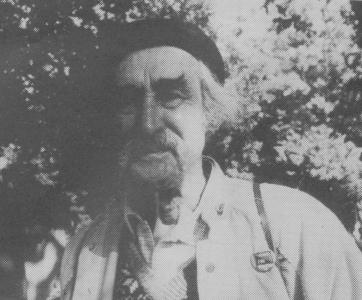 Harvey Buttonshaw was born in England around 1915. He volunteered for service in the Spanish Civil War as an 'ILP supporter' and initially fought alongside George Orwell in a Trokyist militia, the P.O.U.M. He delighted in telling the story of how he told George Orwell to keep his head down or he would be shot. Just after he uttered his warning, Orwell was shot through the neck.
Harvey Buttonshaw was born in England around 1915. He volunteered for service in the Spanish Civil War as an 'ILP supporter' and initially fought alongside George Orwell in a Trokyist militia, the P.O.U.M. He delighted in telling the story of how he told George Orwell to keep his head down or he would be shot. Just after he uttered his warning, Orwell was shot through the neck.
When the P.O.U.M militias were destroyed by the communists, he joined the anarchists and fought in F.A.I. anarchist militias on the Aragon front and Catalonia. With tens of thousands of other participants in the Spanish Civil War he fled over the Spanish border into France. He managed to stay out of the camps the refugees were herded into and with the help of some of the French Anarchist Groups he made his way to Paris just as WWII broke out. The only way he could escape from France after the Nazi invasion was to join the French Foreign Legion.
He was posted to West Africa by the Vichy government and found himself fighting for the Nazis. He deserted and then began a remarkable story of courage and luck. Four of them escaped the Foreign Legion. They crossed West Africa and the Sahara desert. He was the only one who survived. He made his way across the Sahara desert on foot until he bumped into British soldiers in Libya.
Harvey returned to England and joined the merchant navy eventually reaching Australia in 1949. He worked around Australia in a variety of capacities and eventually settled down in Lovers Hill in the Otway ranges in Victoria building his own home with his own hands.
I first met Harvey in 1985. He had made contact with the Libertarian Workers for a Self-Managed Society after hearing about 'The Anarchist World This Week, Encounters with the Third Alternative' on community radio 3CR. He came to Melbourne in 1986 to participate in the Australian Anarchist Centenary celebrations. He told us that he had never seen so many anarchists in one spot since he left Spain in 1939.
Some of us interviewed Harvey with a hand held video camera, six hours of film. I've no idea of what's happened to the film. I assume it's lost, maybe burnt, maybe it's sitting in someone's cupboard, who knows?
At the end of his life, Harvey was honoured by both the French and Spanish governments for his contributions. He lived in the bush at Lavers Hill with his long suffering wife, waiting for death. His life was full of periods of energy and utter exhaustion. I can't remember if he had any children, all I can remember is that he made his way to Australia after WWII, put his head down and did what every immigrant did, make a buck, built a home, got married. Life went on and on, the past became a blurred memory until his interest in his past was rekindled by his contact with this group of young anarchists who thought they could change themselves and the world.
Harvey Buttonshaw died in the mid 1990's after living one of the most interesting lives possible. He didn't believe in God or the state or leaders. He had no faith in government. His newfound brush with fame was due more to his ability to survive than anything else. I thought he may have some answers, maybe he knew the purpose of life. He'd survived while his comrades died. He was covered with the stench of death but survived. Why was he spared? I asked him, he looked at me.
"Joe" he said, "I'm here and they're dead because of plain stupid luck! There's no purpose in life, no master plan, you live it, you die. Whether you live or die has no more rhyme or reason than what card you pick when you cut a deck of cards".
Joseph Toscano
(Compiled from two articles in the Anarchist Age Weekly Review)
Sources: